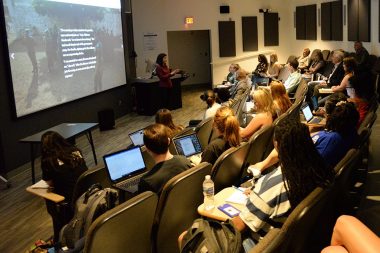Elon University, a Campus Consortium partner of the Pulitzer Center on Crisis Reporting, hosted an April 11 community lecture featuring photojournalist Allison Shelley.
By Nicole Hawley ’21
In an April 11 presentation at the School of Communications, independent documentary photographer Allison Shelley presented her most recent photojournalism work titled “We are fighters, too,” a portrait project depicting the lives of women in the Democratic Republic of the Congo.

“It’s not a place that a lot of people get grant money for because of the conflict that happens there,” said Shelley to an audience in the McEwen screening room. “There are still 120 active groups fighting in the Congo. It’s a very complicated thing to pull apart.”
Shelley began her lecture by sharing her experience visiting a rural clinic and learning about the danger that pregnant women face in conflict zones, as well as the obstacles they must overcome to seek treatment.
“We heard some pretty intense stories from a lot of these women: giving birth in a bush with bullets flying around them, having been routed from their buildings and having to hide for months,” Shelley said.
The larger goal of Shelley’s project, however, was to explore the wide variety of roles that women serve in these communities. She hoped to combat the way that women in the Congo and other conflict zones are viewed solely as victims.
“So many stories about women focus on them only as victims of conflict,” Shelley said. “But I see women who are fighters, who are making tough decisions.”
 Shelley chose to craft a portrait project because she felt it would allow her to highlight the distinctive realities of the many women she met. She viewed the project as a way to empower the women, providing them with a space and platform to share their stories.
Shelley chose to craft a portrait project because she felt it would allow her to highlight the distinctive realities of the many women she met. She viewed the project as a way to empower the women, providing them with a space and platform to share their stories.
“I asked them how they wanted to be portrayed, asked them to wear whatever they wanted to wear, asked them to portray how they were feeling in their active roles,” Shelley said.
Shelley presented the photographs to the audience and shared the narrative of each woman pictured.
“They all chose to be photographed in beautiful places, in beautiful clothing, and to me, that says a lot about who they are,” Shelley said.
“We are fighters, too” was published in The Washington Post. At the end of her lecture, Shelley shared the final product with the audience and was eager to receive feedback for those in attendance.
“I thought it was particularly important to show you the presentation because how it’s produced is part of the journalism, in my opinion,” Shelley said.
Elon is one of the Pulitzer Center’s more than 30 Campus Consortium partners, an educational initiative that brings Pulitzer Center staff and journalists to Elon’s campus twice a year. With Elon’s membership in the consortium, students have the opportunity to work with the center on developing international reporting projects, which have been featured on the center’s website and can be disseminated through media partners.
Thanks to her selection for the Pulitzer Center Student Fellowship, Cammie Behnke ’19 embarked this January on a 12-day reporting trip to Rwanda to report on the economic gender reversal in a post-genocide society.


